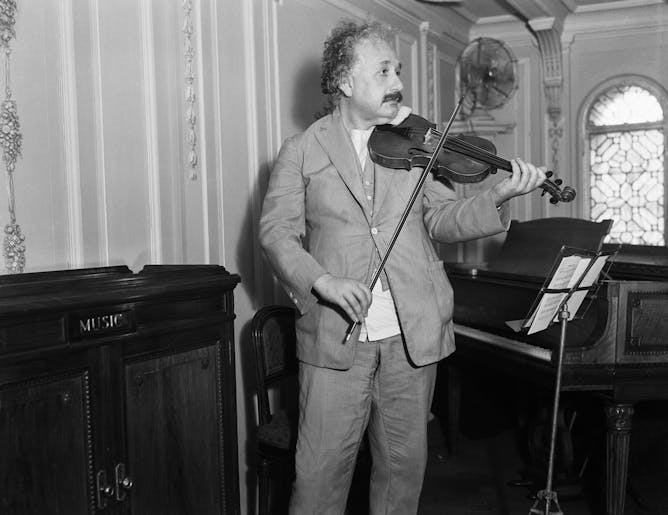|
|
|
|
Richard Feynman, one of the most brilliant physicists of all time, reportedly “only” had an IQ of 125 – a conundrum that is discussed in many corners of the internet. Despite their limitations, IQ tests still gather a huge amount of interest and fascination. Many people, not least Donald Trump, seem obsessed with the concept.
But IQ can’t explain everything. Many great achievements, even in science, rely much more on qualities such as creativity, imagination and curiosity. These traits are independent of IQ and better described by what scientists call “cognitive flexibility” – a skill that enables us to switch between different concepts, or to adapt behaviour to achieve goals in a novel or changing environment.
Research shows that cognitive flexibility is incredibly useful, and linked to better problem solving, creativity, empathy and resilience. It can even help protect against certain cognitive biases, such as confirmation bias. Now scientists are trying to work out how cognitive flexibility can best be trained.
Another topic gathering interest among scientists is Dunbar’s number – the idea that humans can maintain no more than 150 friendships. Despite its fame, the idea has been criticised recently using research that suggests it doesn’t actually hold up. And five years ago today, we woke up to the news that the UK had voted to leave the European Union. Here are five things we’ve learned in that time.
|
Miriam Frankel
Science Editor
|

|
|

Einstein thought imagination was crucial.
Robert and Talbot Trudeau/Flickr
Barbara Jacquelyn Sahakian, University of Cambridge; Christelle Langley, University of Cambridge; Victoria Leong, University of Cambridge
Are you good at changing perspectives? If so, it may benefit you in more ways than you imagine.
|

Photobank gallery/Shutterstock
Johan Lind, Stockholm University; Patrik Lindenfors, Stockholm University
New research calls into question the validity of 'Dunbar's number'.
|

The “Vote Leave” bus got plenty of attention for its bad misuse of statistics. We know a lot more about Brexit now.
Stefan Rousseau / PA images / Alamy stock photo
Uta Staiger, UCL
After the Brexit referendum, the most-Googled question in the UK was 'What does it mean to leave the European Union?' Five years later, we still don't have the full answer.
|
Health + Medicine
|
-
Maria De Jesus, American University School of International Service
The high costs of the world's colossally unequal COVID-19 immunization rates.
-
Liz Breen, University of Bradford
Supply chains, choke points, and 'just in time' manufacturing – where things went right and wrong during the pandemic.
-
Christopher Kirk, Sheffield Hallam University
How does extreme weight cutting affect MMA fighters, and do they actually benefit from it?
|
|
Environment + Energy
|
-
Jesús Marcos Gamero Rus, Universidad Carlos III
Climate change, in its impacts on our society, will have the capacity to destabilise and push social, political and economic systems to their limits. We will have to be bold.
-
David Rose, University of Reading; Marc Hanheide, University of Lincoln; Simon Pearson, University of Lincoln
Autonomous robots hold great promise for the agricultural sector, but it's vital that the public gets a say in their creation.
|
|
Politics + Society
|
-
Rajnaara C Akhtar, De Montfort University; Rebecca Probert, University of Exeter
Unless there are safety reasons for outdoor weddings, it would be far better for local authorities to focus resources on making more slots available
-
Christian Fuchs, University of Westminster
In the 'post-truth' age, what is needed is more public service media, not less.
|
|
Business + Economy
|
-
Louise Curran, TBS Business School ; Jappe Eckhardt, University of York
The CPTPP probably won’t invigorate post-Brexit Britain economically, and it could even be dangerous, geopolitically speaking.
|
|
| |
Featured events
|

|
Online, Whiteknights House, PO Box 217, Reading , Reading, RG6 6AH, United Kingdom of Great Britain and Northern Ireland — University of Reading
|

|
This is a FREE online event (University of Aberdeen), Aberdeen, Aberdeenshire, AB24 3FX, United Kingdom of Great Britain and Northern Ireland — University of Aberdeen
|

|
University of Leeds, Leeds, Leeds, LS2 9JT, United Kingdom of Great Britain and Northern Ireland — University of Leeds
|

|
Online Oxford Martin School Event, Online, Oxfordshire, N/A, United Kingdom of Great Britain and Northern Ireland — University of Oxford
|
|
|
|
| |
| |
| |
| |
| |
|
|
|
|
|
|
|